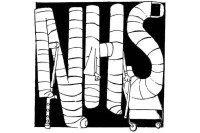I recently had the pleasure of spending some time with my two teenage grandsons, who live in Dorset – 16-year-old Dylan and Isaac, who is 14. Listening to them chatting with their friends, I slowly realised that, half the time, I hadn’t a clue what they were on about. Peculiar words I’d never heard before peppered their ‘convos’. What, I wondered, could be the definitions of ‘leng’ and ‘peng’? What was the meaning behind the mysterious expression ‘SN’? And why did they sometimes exclaim: ‘That’s beg!’ As is the way of the world, a whole new slang vocabulary has been created by their Gen Z.
Ah, the groovy bygone days so fondly remembered by us hip Baby Boomers
This was, of course, a case of history repeating itself. When my two sons were teenagers back in the Nineties, I had to familiarise myself with their new buzz words in order to keep up. And so I learnt that when something was ‘wicked’ or ‘bad’, that meant it was good. When something was described as ‘pants’, it was rubbish. And if a person was attractive they were ‘fit’, if decidedly unattractive, a ‘minger’.
I decided that in the interest of better inter-generational communication, I’d better sit my grandsons down and get to the bottom of their new vocab. So out came my notepad and pen. ‘I’ve heard you reply “Ah, calm” to something one of your mates has said,’ I tell Dylan. ‘What’s that about?’ ‘That just means you agree with them, like “yeah, OK”.’ ‘And if you don’t agree?’ I ask. Isaac pipes up: ‘Then you say “that’s beg!”’ ‘Beg?’ I give him a puzzled look. ‘Why beg?’ He shrugs, grinning. Needless to say, kids don’t know how these odd usages spring up.
Dylan runs through a few other slang terms, for my edification. ‘Let’s say a big bunch of friends are meeting up, in the park or on the beach. Well, that’s called a “motive”.’ ‘How would you use that in a sentence?’ After a moment he says, ‘We had a massive motive down at the beach but the police came and broke it up.’ He continues: ‘When something is really good, well then you’d say “that goes hard”. And if something’s bad, it’s dead.’ ‘Dead?’ ‘Yeah, like, “the food at this café is really dead.’
‘And what about leng and peng?’ I ask. ‘I mean, are those even words?’ ‘When you approve of something you say “that’s peng”,’ explains Dylan. ‘Leng is how you’d describe a really pretty girl.’ He moves quickly on: ‘If you like somebody’s clothes you tell them “that’s a cold fit”.’
By now my head is spinning a little. ‘How on earth does that work?’ ‘Fit. You know, as in outfit.’ ‘Hmm. And your mystifying use of the initials SN?’ Isaac fills me in. ‘Stands for “say nothing”.’ ‘Used in what context?’ He replies: ‘It just means “it’s all good, I understand you, there’s nothing more to say”.’ That’s quite a handy one, I muse.
Our interview over, I reflect on my own slang lingo from my teenage years in the New York of the 1960s. Back then, when something was good it could be ‘boss’ or ‘far out’ and if it was fun it was ‘a gas’. Something you didn’t care for ‘wasn’t your bag’. If you agreed with someone’s statement you would remark ‘damn straight’. ‘Let’s split’ meant let’s go, and when you were taking it easy, you were ‘hanging loose’.
Ah, the groovy bygone days so fondly remembered by us hip Baby Boomers. As you can see, I am inclined to get stuck in a sort of verbal time warp, still happily using some of those preferred slang expressions, even though they are woefully outdated. But what should I do? If I start adopting Gen Z’s bizarre terminology, as it is more in tune with the times, I’d just be ridiculed.
Perhaps I could get creative and forge some new slang of my own – words to suit a middle-class, small-c conservative lady of a certain age navigating her way through the 21st century. Let me think. How about, when something is awful I describe it as so Corbyn, and when something has my approval, I say that’s totally Waitrose? And any tips from fellow Boomers would be most welcome. So do have a think. Ya dig?







Comments
Comments will appear under your real name unless you enter a display name in your account area. Further information can be found in our terms of use.